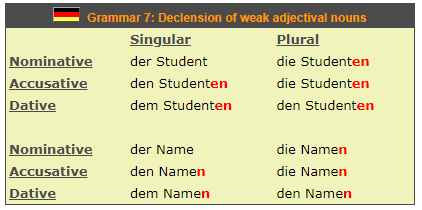As the name suggests, this a group of masculine nouns which predominantly denote living beings. Although they are occasionally confused by students with adjectival nouns, they decline in a different way: weak masculine nouns add "-(e)n" throughout the plural and in all singular cases other than the nominative.

Examples
Ihr Bruder ist Student.
(Her brother is a student (= nominative).)
Das ist ziemlich viel für einen Studenten.
(That's quite a lot for a student (= accusative).)
Meine Schwester ist mit einem Studenten verlobt.
(My sister is engaged to a student (= dative).)
Alle Studenten müssen nach dem Essen abwaschen!
(All of the male students (= nominative) must wash up after the meal!)
Wie ist Ihr Name?
(What is your name (= nominative)?)
Auf welchen Namen geht das Zimmer?
(In what name (= accusative) should I book the room?)
 英语
英语 日语
日语 韩语
韩语 法语
法语 西班牙语
西班牙语 意大利语
意大利语 阿拉伯语
阿拉伯语 葡萄牙语
葡萄牙语 越南语
越南语 俄语
俄语 芬兰语
芬兰语 泰语
泰语 丹麦语
丹麦语 对外汉语
对外汉语

